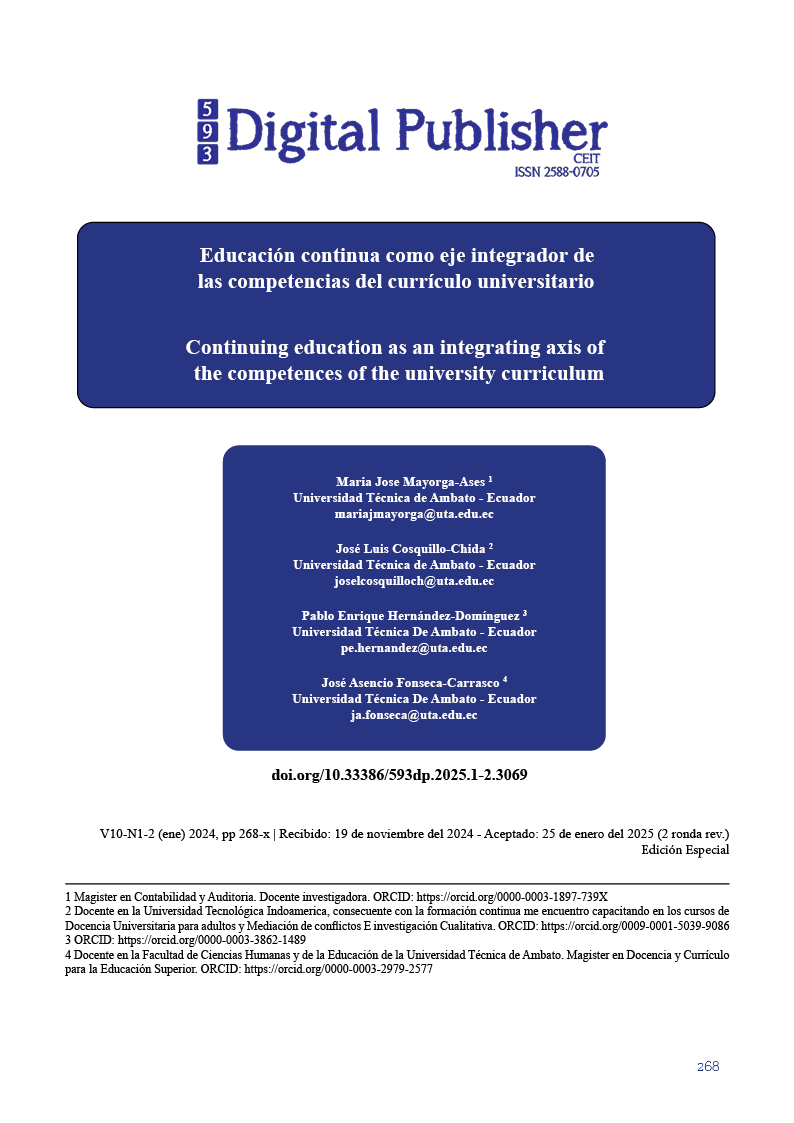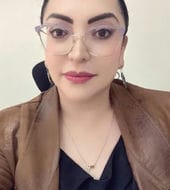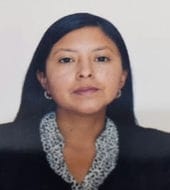Psychopedagogy and inclusive education: challenges and opportunities in the integration of students with disabilities
Main Article Content
Abstract
This study addresses the challenges and opportunities in the integration of students with disabilities through psychoeducation and inclusive education, highlighting the crucial role of assistive technologies in this process. The results show that tools such as screen readers, reading and writing software, interactive mobile applications and assistive technologies in mathematics significantly improve the accessibility of academic content and foster the autonomy and participation of students with disabilities in the classroom. However, the effectiveness of these technologies depends on factors such as teacher training and the availability of technological resources in educational institutions. Continuous and specialised training of teachers in the use of these tools is essential to ensure their effective integration into the educational process. In addition, the study highlights that the digital divide remains a major challenge, as the lack of adequate infrastructure can lead to exclusion rather than inclusion. Finally, it concludes that effective inclusive education requires not only technological resources, but also an inclusive educational culture, including comprehensive training for teachers and public policies that promote equal access to technology.
Downloads
Article Details

This work is licensed under a Creative Commons Attribution-NonCommercial-ShareAlike 4.0 International License.
1. Derechos de autor
Las obras que se publican en 593 Digital Publisher CEIT están sujetas a los siguientes términos:
1.1. 593 Digital Publisher CEIT, conserva los derechos patrimoniales (copyright) de las obras publicadas, favorece y permite la reutilización de las mismas bajo la licencia Licencia Creative Commons 4.0 de Reconocimiento-NoComercial-CompartirIgual 4.0, por lo cual se pueden copiar, usar, difundir, transmitir y exponer públicamente, siempre que:
1.1.a. Se cite la autoría y fuente original de su publicación (revista, editorial, URL).
1.1.b. No se usen para fines comerciales u onerosos.
1.1.c. Se mencione la existencia y especificaciones de esta licencia de uso.
References
Aguirre, P., Villota, F. H., & Mera, S. (2023). Sustainability in higher education in Ecuador- Universidad Técnica del Norte case study. International Journal of Sustainability in Higher Education, 24(5), 1136–1160. https://doi.org/10.1108/IJSHE-07-2021-0268
Almeida, G. de C., Souza, H. R. de, Almeida, P. C. de, Almeida, B. de C., & Almeida, G. H. (2016). The prevalence of burnout syndrome in medical students. Revista de Psiquiatria Clinica, 43(1), 6–10. https://doi.org/10.1590/0101-60830000000072
Almeida, L. M., Silva, D. P. D., Theodório, D. P., Silva, W. W., Rodrigues, S. C. M., Scardovelli, T. A., Silva, A. P. D., & Bissaco, M. A. S. (2019). ALTRIRAS: A Computer Game for Training Children with Autism Spectrum Disorder in the Recognition of Basic Emotions. International Journal of Computer Games Technology, 2019, 4384896. https://doi.org/10.1155/2019/4384896
Axpe Caballero, M. Á. (2005). Contributions of the action-research to the evaluation, analysis and intervention of the language difficulties[Contribuciones de la Investigación-Acción a la evaluación, análisis e intervención de las dificultades del lenguaje]. Revista de Logopedia, Foniatria y Audiologia, 25(4), 162–173. https://doi.org/10.1016/S0214-4603(05)75834-4
Castro, J., Lafuente, E., & Jiménez, B. (2009). THE SOUL OF SPAIN: Spanish Scholastic Psychology and the Making of Modern Subjectivity (1875-1931). History of Psychology, 12(3), 132–156. https://doi.org/10.1037/a0016858
Chacón-López, H., & López-Justicia, M. D. (2020). Self-Concept difficulties according to sex and studies of young people with retinitis pigmentosa[Dificultades En El Autoconcepto En FunciÓN Del Sexo Y Estudios De JÓVenes Con Retinosis Pigmentaria]. Revista Espanola de Orientacion y Psicopedagogia, 31(1), 98–112. https://doi.org/10.5944/reop.vol.31.num.1.2020.27292
Corujo-Vélez, C., Barragán-Sánchez, R., Hervás-Gómez, C., & Palacios-Rodríguez, A. (2021). Teaching innovation in the development of professional practices: Use of the collaborative blog. Education Sciences, 11(8), 390. https://doi.org/10.3390/educsci11080390
Dávila, C. A. H., Hernández, R. S. V., Ases, L. A. M., & Salto, S. V. H. Del. (2023). Métodos de enseñanza del razonamiento lógico matemático para estudiantes universitarios. AlfaPublicaciones, 5(4), 33–48. https://doi.org/10.33262/ap.v5i4.409
de la Torre, E. H., & Rodríguez, A. F. (2020). Opinions of young university collectives to discrimination situation[Opiniones de jÓvenes universitarios/as hacia colectivos en situaciÓn de discriminaciÓN]. Prisma Social, 30, 276–294.
D’isanto, T., D’elia, F., Altavilla, G., Aliberti, S., Esposito, G., Di Domenico, F., & Raiola, G. (2022). In Italy compatibility between qualifying training objectives of degree courses in sport sciences and exercise and the kinesiologist profile. Trends in Sport Sciences, 29(3), 99–105. https://doi.org/10.23829/TSS.2022.29.3-3
Domínguez, C. Q., de Ormaechea Otarola, V., & Valls-Figuera, R. (2024). The views of students from Spain and Latin America on the impact of the on-line master’s degree in psychopedagogy on their professional development[Percepció de l’alumnat d’Espanya i Llatinoamèrica sobre l’impacte del màster en línia en Psicopedagogia en referència al seu desenvolupament professional][Percepción del alumnado de España y Latinoamérica sobre el impacto del máster en línea en Psicopedagogía en su desarrollo profesional]. Educar, 60(2), 447–464. https://doi.org/10.5565/rev/educar.2043
Fernández-Cruz, F. J., Rodríguez-Mantilla, J. M., & del Pulgar Cinque, S. G. (2023). Evaluation of the Master’s Degree in Psychopedagogy in Spain: impact of the accreditation process[Evaluación del Máster en Psicopedagogía en España: impacto del proceso de acreditación]. Revista Fuentes, 25(2), 138–153. https://doi.org/10.12795/revistafuentes.2023.22314
Figueroa, C., & Farnum, F. (2020). Neuroeducation as a contribution to the difficulties of lear ning in the infantile population. A look from psychopedagogy in Colombia[Como aporte a las dificultades del aprendizaje en la población infantil. una mirada desde la psicopedagogía en colombia la neuroeducaciÓn]. Universidad y Sociedad, 12(5), 17–26.
Fotouhi-Ghazvini, F., Fotouhi-Ghazvini, F., Excell, P. S., Moeini, A., & Robison, D. J. (2008). A psycho-pedagogical approach to m-learning in a developing-world context. International Journal of Mobile Learning and Organisation, 2(1), 62–80. https://doi.org/10.1504/IJMLO.2008.018718
García, M. L. R., & Cortizas, M. I. (2011). Competency training through Practicum: A pilot study[La formación en competencias a través del practicum: Un estudio piloto]. Revista de Educacion, 354, 99–124.
García, O. M., & Mas, P. F. (2021). New roles and strategies for educational psychology counselling to promote inclusive education in the valencian community[Nuevos roles y estrategias de asesoramiento psicopedagógico para promover la educación inclusiva en la comunidad valenciana]. Revista Espanola de Orientacion y Psicopedagogia, 32(1), 59–75. https://doi.org/10.5944/REOP.VOL.32.NUM.1.2021.30740
Gonzalez-Torres, P., Cabrera-Solano, P., & Castillo-Cuesta, L. (2023). Stakeholders’ Perceptions of Teaching and Technological Skills in EFL Vocabulary Instruction: Implications for Remote Learning. International Journal of Learning, Teaching and Educational Research, 22(7), 173–192. https://doi.org/10.26803/ijlter.22.7.10
Iaconis, F. R., Jiménez Gandica, A. A., Del Punta, J. A., Delrieux, C. A., & Gasaneo, G. (2021). Information-theoretic characterization of eye-tracking signals with relation to cognitive tasks. Chaos, 31(3), 033107. https://doi.org/10.1063/5.0042104
Jover, M., Doudoux, D., & Deveaux, E. (2006). Representations of the dental surgery profession and the motivations given by second-year French students for applying for dental surgery. European Journal of Dental Education, 10(1), 2–9. https://doi.org/10.1111/j.1600-0579.2006.00386.x
Lara Satán, A. A., Satán, N. L., Velastegui Hernández, R. S., & Pullas Tapia, P. S. (2020). Organization and management in the prevention of occupational psychosocial risks in urban public transport. Universidad y Sociedad, 12(4).
Lazarakou, E. (2024). Students’ Artistic Creation as an Alternative Assessment Task in a Non-artistic Course Within Higher Education. International Journal of Education and the Arts, 25(28), 1–25. https://doi.org/10.26209/ijea25n28
Lo, C. K., Hew, K. F., & Chen, G. (2017). Toward a set of design principles for mathematics flipped classrooms: A synthesis of research in mathematics education. Educational Research Review, 22, 50–73. https://doi.org/10.1016/j.edurev.2017.08.002
Lobos, K., Cobo-Rendón, R., Sáez, F., Mella, J., & Cisternas, N. (2023). Return to Face-to-Face Classrooms in Higher Education: Students Experiences in Chile, Venezuela, and Ecuador. Emerging Science Journal, 7(Special), 217–237. https://doi.org/10.28991/ESJ-2023-SIED2-017
Lopes, P. S. M., Silva, C. A., Valtensir, L., Targa, C. N., & Conrado, D. B. F. (2018). A survey of recent developments in management cognitive neuroscience and machine learning in educational environment [Uma pesquisa de recentes desenvolvimentos em gestão de neurociência cognitiva e aprendizado de máquina em ambiente educacional]. Iberian Conference on Information Systems and Technologies, CISTI, 2018, 1–4. https://doi.org/10.23919/CISTI.2018.8399206
Margalef García, L., & Pareja Roblin, N. (2008). Innovation, research and professional development in higher education: Learning from our own experience. Teaching and Teacher Education, 24(1), 104–116. https://doi.org/10.1016/j.tate.2007.03.007
Mayorga-Ases, M. J., Tagua-Moyolema, A. E., Germán Muyulema-Muyulema, D., & Santiago Velastegui-Hernández, R. (2024). Estudio sobre la implementación de metodologías activas en la educación superior: beneficios y desafíos. 593 Digital Publisher CEIT, 9(4–1), 196–208. https://doi.org/10.33386/593dp.2024.4-1.2739
Mellado, L., Luengo, M. R., de la Montaña, J. L., & Bermejo, M. L. (2015). Emotions in personal metaphors of prospective secondary economics, science, and psychopaedagogy teachers. In Progress in Economics Research (Vol. 30, pp. 27–46). Nova Science Publishers, Inc.
Montoya-Fernández, C., Gil-Madrona, P., Losada-Puente, L., & Gómez-Barreto, I. M. (2024). Play-Based Assessment: Psychometric Properties of an Early Childhood Learning and Development Assessment Battery. Education Sciences, 14(11), 1240. https://doi.org/10.3390/educsci14111240
Montoya-Fernández, C., Losada-Puente, L., Gómez-Barreto, I. M., & Gil-Madrona, P. (2024). Developmental play-based assessment in early childhood education: a systematic review. European Early Childhood Education Research Journal, 32(5), 788–813. https://doi.org/10.1080/1350293X.2024.2311100
Moreno, G. C., & Delgado, S. C. (2013). Assessment of digital competence and attitudes towards ICT of university students [Evaluación de la competencia digital y las actitudes hacia las tic del alumnado universitario]. Revista de Investigacion Educativa, 31(2), 517–536. https://doi.org/10.6018/rie.31.2.169271
Planella-Ribera, J., Chiva-Bartoll, O., Salvador-Garcia, C., & Pallarés-Piquer, M. (2022). Audiovisual bodygraphies and education. Designing vanishing lines for teachers’ masculinities from a sensitive pedagogy[Corpografías audiovisuales y educación. Diseñando líneas de fuga para nuevas masculinidades docentes desde la pedagogía sensible]. Fotocinema, 25, 411–434. https://doi.org/10.24310/Fotocinema.2022.vi25.14535
Raiola, G. (2011). A study on Italian primary school rules: Neurophysiological and didatics aspects n phisical education and sport. Journal of Physical Education and Sport, 11(2), 43–48.
RamÍrez, J. C. C., & Carrasco, S. A. N. (2020). Aprendizaje colaborativo en lÍnea, una aproximaciÓn empÍrica al discurso socioemocional de los estudiantes Collaborative Online Learning, an Empirical Approach to Students’ Socio-Emotional Discourse. Revista Electronica de Investigacion Educativa, 22, 1–12. https://doi.org/10.24320/redie.2020.22.e20.2329
Reluz-Barturén, F. F., & Palacios-Alva, C. Y. (2021). Family health in the context of covid-19 and prevention from emotional education. Latin american bibliographic-documentary analysis[Salud familiar en contexto de covid-19 y prevención desde la educación emocional. Análisis bibliográfico-documental latinoamericano]. Medicina Naturista, 15(1), 54–60.
Rivilla, A. M., Garrido, M. C. D., & Romero, C. S. (2013). Evaluation of student competences: Assessment techniques and models[Evaluación de las competencias de los estudiantes: Modelos y técnicas para la valoración]. Revista de Investigacion Educativa, 31(1), 239–255. https://doi.org/10.6018/rie.31.1.157601
Rosa, J. P. P. (2025). The potential role of artificial intelligence to promote the participation and inclusion in physical exercise and sports for people with disabilities: A narrative review. Journal of Bodywork and Movement Therapies, 42, 127–131. https://doi.org/10.1016/j.jbmt.2024.12.024
Salamanca, O. G. H. (2020). Social perception of the school guidance in Bogota’S school counselors[PercepciÓn social de la orientaciÓn escolar en orientadores de bogotÁ]. Revista Espanola de Orientacion y Psicopedagogia, 31(1), 131–144. https://doi.org/10.21307/2020-04-21T063135Z
Santiago Velastegui-Hernández, R., Romero-Peña, S. M., Carolina Martínez-Pérez, S., & Germán Muyulema-Muyulema, D. (2024). Analysis of Ecuador’s Higher Education processes. 593 Digital Publisher CEIT, 9(4–1), 106–117. https://doi.org/10.33386/593dp.2024.4-1.2655
Silva-Martínez, G., Iglesias-Martínez, M. J., & Lozano-Cabezas, I. (2023). A Qualitative Study on Barriers in Learning Opportunities in Ecuadorian Higher Education. Societies, 13(3), 56. https://doi.org/10.3390/soc13030056
Souza y Machorro, M. (2022). Lexicon in mental health[El léxico en la salud mental]. Neurologia, Neurocirugia y Psiquiatria, 50(2), 60–73. https://doi.org/10.35366/108560
Stones, E. (1987). Teaching practice supervision: Bridge between theory and practice. European Journal of Teacher Education, 10(1), 67–79. https://doi.org/10.1080/0261976870100109
Tereso, S. (2012). Environmental education through art. International Journal of Education Through Art, 8(1), 23–47. https://doi.org/10.1386/eta.8.1.23_1
Tragodara, K. S. C. (n.d.). Virtual tutoring from the comprehensive training model to Engineering students during the COVID-19 pandemic. EDUNINE 2021 - 5th IEEE World Engineering Education Conference: The Future of Engineering Education: Current Challenges and Opportunities, Proceedings, 2021. https://doi.org/10.1109/EDUNINE51952.2021.9429115
Veintimilla, A. M. U., Cheme, R. K. G., Muñoz, H. Z., Chavarría, M. T., & Vélez, W. A. Z. (2024). Psychopedagogy in the application of recreational games with students with specific learning difficulties [La psicopedagogía en la aplicación de los juegos recreativos con estudiantes con dificultades específicas del aprendizaje]. Retos, 55, 992–998. https://doi.org/10.47197/retos.v55.104617
Velastegui, R., Poler, R., & Díaz-Madroñero, M. (2025). Revolutionising industrial operations: The synergy of multiagent robotic systems and blockchain technology in operations planning and control. Expert Systems with Applications, 269, 126460. https://doi.org/10.1016/J.ESWA.2025.126460
Velastegui-Hernández, R., Hernández-Chérrez, E. de los Á., Salto, S. V. H.-D., & Mayorga-Ases, M. J. (2024). Competencias de la Educación Superior en Ecuador. 593 digital Publisher CEIT, 9(4–1), 118–129. https://doi.org/10.33386/593dp.2024.4-1.2682
Weissenborn, K., Giewekemeyer, K., Heidenreich, S., Bokemeyer, M., Berding, G., Ahl, B., Van Cauter, S., Severino, M., Ammendola, R., Van Berkel, B., Vavro, H., van den Hauwe, L., Rumboldt, Z., Tylenda, B., Beckett, J., in, R. B.-I. R. of R., 2007, undefined, Thompson-Schill, S. L. S., Jonides, J., … Espinoza Pastén, L. (2020). Aportes desde las neurociencias para la comprensión de los procesos de aprendizaje en los contextos educativos. PropÃtextthreesuperiorsitos y Representaciones, 8(1), 312. http://revistas.usil.edu.pe/index.php/pyr/article/view/312





